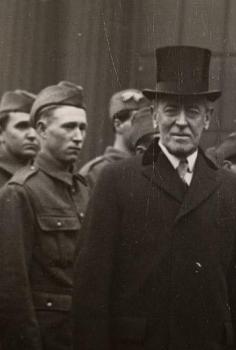
Clothed in white robes and arms outstretched, C. Howard Walker’s patriotic, feminine figure stands resolute in her goal to unite immigrant women in the United States of America. The figure, however, is more than a unifying presence: she is America.
Specifically, the figure represents the thousands of Young Women’s Christian Association (YWCA) volunteers who mobilized during World War I to support women workers on the home front. At the same time, YWCA volunteers began a concerted drive to Americanize and assimilate immigrant girls and women.
As early as 1910, the YWCA created International Institutes that had two purposes. They offered English classes, recreational opportunities, and employment, housing and naturalization assistance. They also served as centers for assimilation efforts by the YWCA.
Why? Widespread concern about the immigrant population was increasing during the early twentieth century. By the time the U.S. entered the war in 1917, these concerns had materialized into restrictive government legislation and a demand for societal assimilation. The YWCA, already familiar with assimilation programs, ramped up efforts to Americanize immigrant girls and women, who in turn could teach their families American patriotic values and American customs – particularly girls who grew up in the U.S. and could bridge the culture gap for their mothers and other family members.
For the YWCA, “Americanization” involved more than learning English. The institutes provided courses on sewing, cooking and music, all taught through a white American lens. Moreover, when the U.S. began its extensive food conservation program and Liberty Loan campaign, YWCA volunteers enlisted immigrant women into these programs to demonstrate their “Americanness.”
Propaganda posters like “YWCA for United America” emphasized the organization’s work to both assimilate and embrace immigrant girls and women within America’s outstretched arms.
This recent acquisition expands the Museum’s collection of women’s material culture related to the war, specifically highlighting the service of the YWCA.






